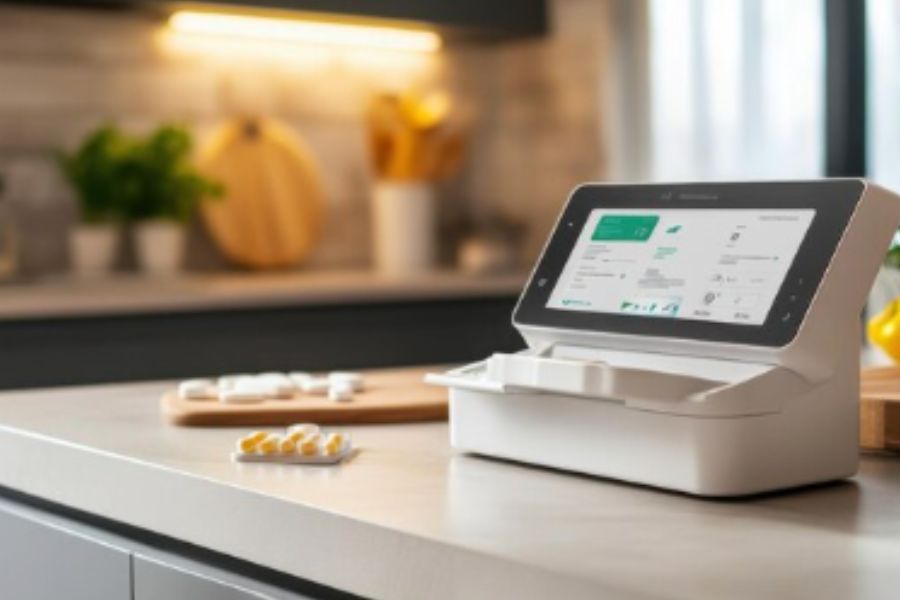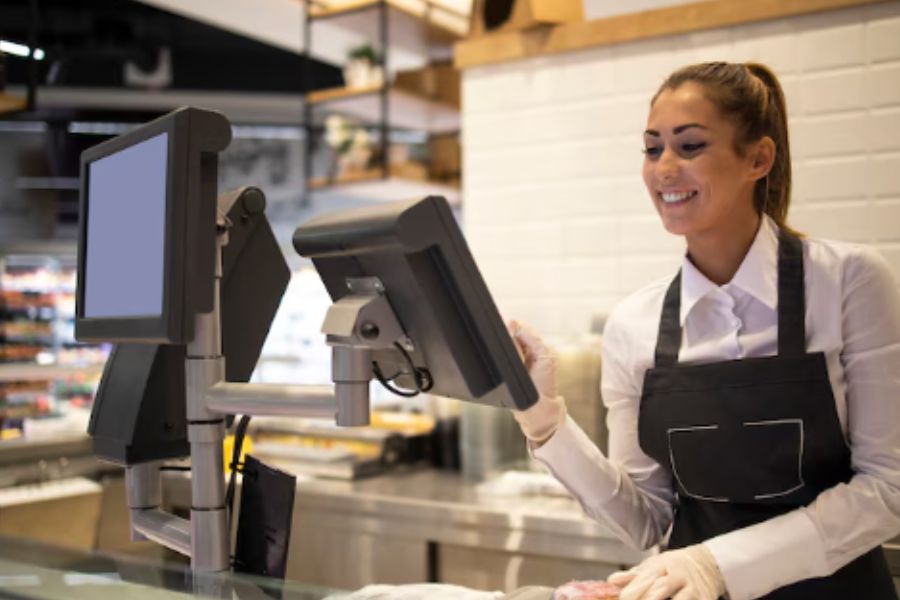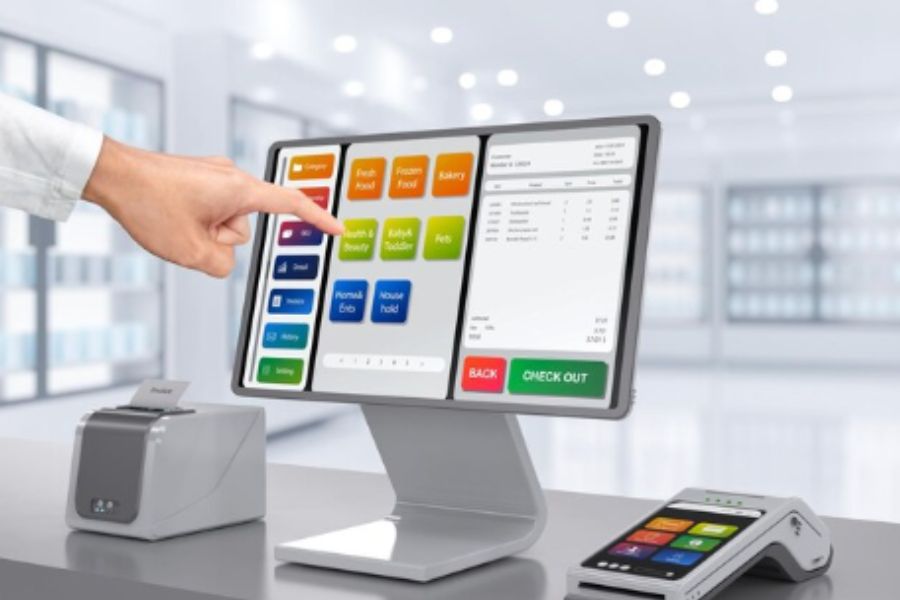In the home decor and furniture industry, success depends on efficient operations, seamless customer experiences, and effective inventory management. Simplifying these procedures is primarily dependent on a POS system, which helps companies to efficiently manage sales, maintain inventory levels, and improve customer relations. Let’s explore the role of a POS for home decor and furniture so that they can streamline their operations, gain valuable insights into sales trends, and enhance the overall customer experience.
Highlight:
- A POS system for home decor and furniture businesses centralizes inventory, sales, and customer data to simplify complex transactions and support a consistent shopping experience across channels.
- Key features include real-time stock tracking, custom order management, integrated CRM, multi-channel sales support, and secure, flexible payment options.
Overview of POS for Home Decor & Furniture Businesses
POS systems play a central role in the home decor and furniture retail space. These businesses handle everything from small accessories to large custom-made pieces, each requiring different approaches to sales, stock tracking, and fulfillment.
A modern POS system brings these tasks into one platform, simplifying sales transactions, inventory updates, and coordination between physical locations and online storefronts.
In a design-focused market like home decor, where customer experience drives repeat business, a POS supports smoother checkouts, accurate order tracking, and consistent service across all touchpoints. This applies whether you’re operating a single boutique or managing multiple branches.
As consumers expect more convenience and personalization, retailers in this sector are shifting toward smarter POS solutions that can meet rising demands and support long-term growth.
As shopping habits evolve and the demand for personalization and convenience grows, adopting a modern POS system becomes essential for success in the home and furniture sector.
Key Features of an Effective POS for Home Decor and Furniture Businesses
An effective home decor POS software should provide a full range of tools and functionalities to optimize operations, enhance the customer experience, and support business growth.
User-Friendly Interface
A POS system with an intuitive interface ensures that staff can operate it with minimal training, reducing errors and enhancing productivity. An easy-to-navigate system accelerates the checkout process, leading to improved customer experiences and increased sales.
Integration with E-commerce Platforms
Combining online and in-store operations is absolutely vital in the digital world. A POS for home that synchronizes with e-commerce platforms ensures consistent inventory levels, unified sales data, and a seamless shopping experience for customers across all channels.
Mobile POS Capabilities
Mobile POS systems empower staff to assist customers and process transactions anywhere in the store, enhancing the shopping experience. This flexibility is particularly beneficial in large furniture showrooms, allowing for personalized customer service and reduced wait times.
Customization Options for Home Decor and Furniture Products
A POS for home should support product variations, custom orders, and special requests to accommodate the diverse and personalized nature of furniture and home decor items. This function addresses particular preferences, therefore improving customer happiness and guaranteeing proper order processing.
Support for Multiple Payment Methods
Offering various payment options, including credit/debit cards, mobile payments, and digital wallets, caters to customer preferences and enhances the checkout experience. A versatile POS for home ensures secure and efficient payment processing, accommodating the diverse needs of shoppers.
Benefits of Using a POS for Home Decor and Furniture Businesses
Managing a home decor or furniture business involves managing high-value items, custom orders, and a wide range of product types. A tailored POS system simplifies daily operations, improves service delivery, and supports sales across both physical and digital channels.
Streamlined Sales Process
A POS system automates and simplifies sales transactions, making checkout faster and more efficient. Customers no longer have to endure long wait times, and staff can handle transactions with greater ease.
- Faster Checkout: A modern POS processes payments quickly, reducing queues and improving customer satisfaction.
- Barcode Scanning & Quick Item Lookup: Staff can quickly access product details and pricing to avoid delays or errors.
- Custom Orders & Quotations: Many purchases in this sector are made-to-order. A POS supports accurate order intake, special requests, and quote generation.
- Multi-Channel Sales Tracking: All sales, from in-store, online, or over the phone, are recorded in one place for better visibility.
Inventory Management
Inventory is especially complex in this sector, where items vary by size, material, and customization. A POS system with advanced inventory tracking ensures businesses never run out of stock or overstock unnecessary items.
- Real-Time Inventory Updates: Stock levels adjust automatically after each sale, reducing miscounts and overselling.
- Stock Alerts & Reordering: Set thresholds to receive alerts when inventory is running low, and even automate reorder processes with preferred suppliers.
- Supplier Management: Easily manage different product variations such as color, size, material, and bundled sets (e.g., matching dining table and chairs).
- Product Bundling & Variations: Track multiple vendors, purchase orders, and incoming stock to streamline restocking processes and avoid delays.
Customer Relationship Management (CRM)
Building trust and familiarity with customers encourages repeat visits. A POS with CRM functions supports personalized service and smarter marketing.
- Customer Profiles: Collect and store key information like purchase history, product preferences, delivery addresses, and contact details.
- Loyalty Programs & Rewards: Encourage return visits with point-based rewards or exclusive discounts.
- Targeted Promotions: Use customer data to send tailored offers via email or SMS, such as birthday discounts or promotions on previously browsed items.
- Follow-ups & Service Reminders: Schedule post-purchase communication such as care instructions, feedback requests, or delivery notifications to improve the customer experience.
Financial Reporting and Analytics
Understanding what’s working and what’s not keeps the business on track. POS systems provide visibility into all aspects of performance.
- Sales Reports & Trends Analysis: Identify bestsellers, slow-moving stock, and seasonal peaks.
- Profit Margins & Cost Analysis: Break down margins by product or category to support smarter pricing.
- Tax & Compliance Management: Generate tax-ready reports aligned with local requirements.
- Employee Performance Tracking: Monitor sales per staff member, shift hours, and commissions to improve team management.
E-commerce Platform Integration
Retailers need to meet customers wherever they shop. A POS integrating with online platforms will unify operations and eliminate manual work.
- Unified Inventory Management: Sync stock in real time between online and offline stores.
- Omnichannel Shopping Experience: Support services like in-store pickup or online returns for added convenience.
- Automated Order Processing: Reduce errors and save time by auto-syncing online orders with fulfillment processes.
- Integration with Leading Platforms: Connect seamlessly with platforms like Shopify, Magento, WooCommerce, or BigCommerce using systems like ConnectPOS.
Easy Payment Processing
Customers shopping for furniture or décor often prefer a range of payment choices. A reliable POS supports these preferences without adding complexity.
- Multiple Payment Options: Accept all major credit and debit cards, mobile payments like Apple Pay and Google Pay, and alternative methods like Buy Now, Pay Later (BNPL).
- Split Payments & Financing: Allow customers to split payments between different methods or opt for installment plans.
- Secure Transactions: Ensure all transactions are PCI-compliant and encrypted to protect sensitive customer data.
- Contactless Payments: Offer tap-to-pay or QR code payment options for fast, touch-free transactions.
How to Choose the Right POS for Home Decor and Furniture Businesses
Selecting the right POS system for a home decor and furniture store requires careful consideration. The ideal POS should align with business needs, streamline operations, and improve the customer experience. With many options available, businesses must evaluate features, costs, and support services before making a decision.
Every business operates differently, so understanding specific requirements is the first step. Home decor and furniture stores should consider:
- Inventory Management: Furniture and decor items vary in size, materials, and customization, requiring a POS that efficiently tracks stock levels and variations.
- Sales Channels: If selling in-store and online, a POS that integrates with e-commerce platforms is necessary to maintain accurate inventory and sales data.
- Payment Flexibility: A good POS should support various payment methods, including credit/debit cards, mobile wallets, and installment plans.
- Scalability: As the business grows, the POS should accommodate new locations, higher transaction volumes, and additional features without major upgrades.
Additionally, investing in a POS system comes with upfront and ongoing costs, so businesses should carefully assess:
- Subscription Fees: Monthly or annual costs can vary depending on the provider and feature set.
- Transaction Fees: Some POS providers charge a percentage per sale, affecting profit margins.
- Additional Features & Customization: Businesses may need to pay extra for advanced reporting, customer management tools, or industry-specific features.
Why ConnectPOS Works for Home Decor and Furniture Retailers
ConnectPOS is a strong fit for home decor and furniture stores looking for an adaptable, retail-specific POS system. It addresses the unique demands of the industry with features designed to simplify complex sales and inventory scenarios.
- E-commerce Integration: Connects easily with Shopify, Magento, WooCommerce, and other platforms to keep inventory and sales data aligned across all channels.
- Advanced Inventory Tools: Manages variations in size, color, material, and product sets; supports multi-location stock visibility and supplier coordination.
- Omnichannel Selling Features: Offers showroom ordering, in-store pickups, and cross-channel fulfillment to match evolving customer habits.
- Flexible Payment Options: Supports digital wallets, mobile payments, and installment plans—ideal for high-value purchases.
- Insightful Reporting: Helps identify sales trends, customer preferences, and inventory movement through real-time data dashboards and reports.
With ConnectPOS, home decor and furniture businesses can enhance efficiency, provide a seamless shopping experience, and scale effortlessly as they grow.
FAQs: POS for Home
- How does a POS for home improve inventory management?
A POS for home provides real-time inventory tracking, stock alerts, and automatic reordering. It efficiently handles product variations (e.g., colors, sizes, materials) and prevents stockouts or overstocking
- How much does a POS for home decor and furniture cost?
POS costs vary based on features, hardware, and scalability, typically ranging from $1,000 to $10,000, with additional subscription fees.
- Can a POS for home integrate with e-commerce platforms?
Yes, leading POS for home solutions sync with platforms like Shopify, Magento, and WooCommerce, ensuring consistent inventory levels and a seamless shopping experience across online and physical stores.
Conclusion
In sum, a POS for home is an indispensable tool for home decor and furniture businesses, enabling seamless sales, efficient inventory management, and enhanced customer experiences. By integrating with e-commerce platforms, supporting flexible payment options, and offering real-time data insights, a POS for home helps businesses streamline operations and drive growth.
With the right POS for home, retailers can optimize multi-channel sales, manage product variations effortlessly, and provide personalized customer service. As the industry evolves, adopting a modern POS for home ensures businesses remain competitive, adaptable, and ready for future trends.
Leading the way in innovative POS solutions, ConnectPOS stands out for its versatility and scalability. To learn more about how ConnectPOS can transform your home decor and furniture business, contact us today.



